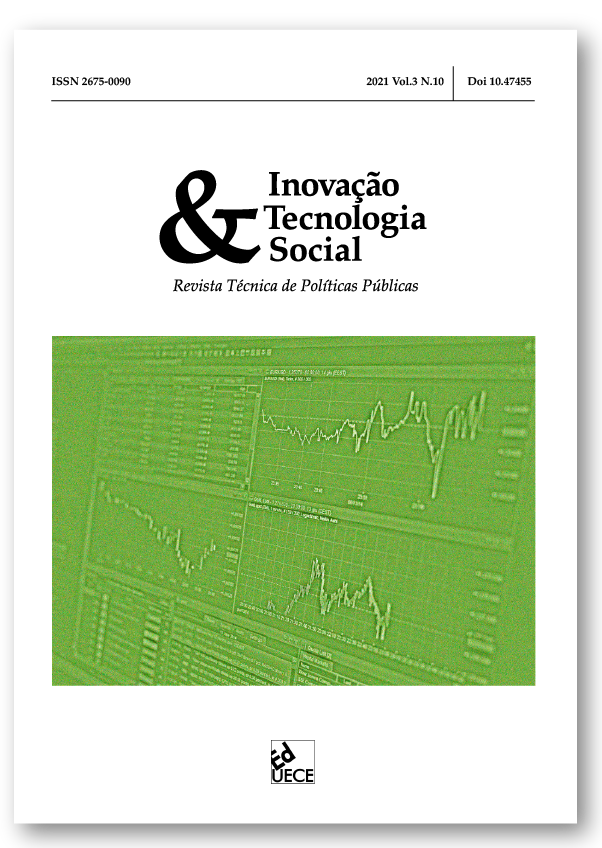A operacionalização do SIPIA Conselho Tutelar pelos Conselheiros e suas implicações na formulação de políticas públicas e na proteção de crianças e adolescentes de Fortaleza
DOI:
https://doi.org/10.47455/2675-0090.2023.4.10.10568Palabras clave:
conselho tutelar, criança e adolescente, conselheiro tutelar, sipiaResumen
A pesquisa em questão teve como objetivo geral compreender as implicações da operacionalização dos dados das violações contra as crianças e adolescentes de Fortaleza no “SIPIA Conselho Tutelar” (Sistema de Informação para a Infância e Adolescência) exclusivamente pelos Conselheiros Tutelares no período de 2019 a 2021. Os objetivos específicos foram: identificar o processo de operacionalização do “SIPIA Conselho Tutelar” nos Conselhos Tutelares de Fortaleza; analisar os dados constantes do “SIPIA Conselho Tutelar” sobre as violações contra as crianças e adolescentes de Fortaleza no período de 2019 a 2021, considerando o IDH dos bairros mais atingidos, as regionais e os conselhos a que pertencem; averiguar o conhecimento dos Conselheiros Tutelares sobre o processo de operacionalização do “SIPIA - Conselho Tutelar”. Em termos metodológicos, utilizou-se das pesquisas bibliográfica e documental, e realizou-se uma pesquisa empírica através da utilização de entrevista semiestruturada com duas analistas jurídicas que atuam junto aos Conselheiros Tutelares da capital cearense. A análise e interpretação dos dados foram de dois tipos: análise de conteúdo (BARDIN, 2016) para os documentos escritos e a análise de discurso (MINAYO, 1994) para os dados colhidos na pesquisa de campo. Também foram coletados e analisados os dados presentes nos relatórios do “SIPIA Conselho Tutelar – Sistema de Informação para a Infância e a Adolescência”. Feita a triangulação dos dados (GIL, 1946) ao final da pesquisa, concluiu-se que: os únicos operadores do SIPIA são os próprios conselheiros tutelares, que recebem treinamento oferecido pela Fundação da Criança e da Família Cidadã – FUNCI. Por conseguinte, os dados mostraram ainda que durante a pandemia do Covid-19, os índices de violações dos direitos das crianças e adolescentes de Fortaleza aumentaram significativamente, comparando-os com o período de um ano antes dessa crise sanitária mundial. Finalmente, chega-se à reflexão que não há um acompanhamento contínuo na preparação dos conselheiros tutelares de modo que os deixem qualificados o suficiente para a operacionalização do SIPIA. Isso implica na formulação de políticas públicas e na proteção de crianças e adolescentes de Fortaleza.
Citas
BEZERRA, Mayara Simon. Infância descolorida: a criança vítima de violência sexual e o trabalho interdisciplinar. 2017. Dissertação (Mestrado em Serviço Social) – Faculdade de Ciências Humanas e Sociais, Universidade Estadual Paulista “Júlio de Mesquita Filho”, Franca, 2017. Disponível em: https://repositorio.unesp.br/bitstream/handle/11449/152674/Bezerra_MS_me_fran.pdf?sequence=3&isAllowed=y. Acesso em: 26 nov. 2020.
BRASIL. [Constituição (1988)]. Constituição da República Federativa do Brasil de 1988. Brasília, DF: Presidência da República, 2016. Disponível em: http://www.planalto.gov.br/ccivil_03/constituicao/constituicao.htm. Acesso em: 01 dez. 2021.
BRASIL. Ministério da Mulher, da Família e dos Direitos Humanos. Manual do Usuário do SIPIA Conselho Tutelar. Brasília, DF: MMFDH, 2016.
BRASIL. Coordenação-Geral de Fortalecimento de Garantia de Direitos,
Secretaria Nacional dos Direitos da Criança e do Adolescente, Ministério da Mulher, da Família e dos Direitos Humanos. Manual do Usuário do SIPIA Conselho Tutelar. Versão 2.0. Brasília, DF: SIPIA, 2019. Disponível em: https://sipiaconselhotutelar.mdh.gov.br/uploads/ManualdoUsuario-SIPIACT.pdf. Acesso em: 11 ago. 2021.
BRASIL. Lei n. 8.069, de 13 de julho de 1990. Dispõe sobre o Estatuto da Criança e do Adolescente e dá outras providências. Brasília, DF: Planalto, 1990. Disponível em: http://www.planalto.gov.br/ccivil_03/leis/l8069.htm. Acesso em: 24 abr. 2021.
FORTALEZA. Lei n. 9.843, de 11 de novembro de 2011. Dispõe sobre a organização e o funcionamento dos Conselhos Tutelares e o regime jurídico dos conselheiros tutelares de Fortaleza e dá outras providências. Fortaleza, CE: CMFOR, 2011. Disponível em: https://sapl.fortaleza.ce.leg.br/ta/312/text?. Acesso em: 17 set. 2021.
FORTALEZA. Secretaria Municipal de Desenvolvimento Econômico. IDH dos bairros de Fortaleza 2010. Fortaleza, CE: SDE-PMF, 2010. Disponível em: https://observatoriodefortaleza.fortaleza.ce.gov.br/publicacoes. Acesso em: 10 ago. 2021. (SDE-PMF, 2010).
GIL. Antônio Carlos. Como elaborar projetos de pesquisa. 6.ed. São Paulo: Atlas, 2019.
IBGE - INSTITUTO BRASILEIRO DE GEOGRAFIA E ESTATÍSTICA. Censo Brasileiro de 2010. Rio de Janeiro: IBGE, 2012. Disponível em: https://censo2010.ibge.gov.br/sinopse/index.php?dados=26&uf=23#topo_piramide. Acesso em: 27 jan. 2022.
IBGE - INSTITUTO BRASILEIRO DE GEOGRAFIA E ESTATÍSTICA. Censo Brasileiro de 2010. Rio de Janeiro: IBGE, 2012. Disponível em: https://cidades.ibge.gov.br/brasil/ce/panorama. Acesso em: 27 jan. 2022.
LEMOS, Rômulo Holanda de Oliveira. Conselho Tutelar e família: abordagens, estratégias e desafios: um estudo sobre os Conselhos Tutelares de Fortaleza (CE). 2019. Dissertação (Mestrado Profissional em Planejamento e Políticas Públicas) - Centro de Estudos Sociais Aplicados, Universidade Estadual do Ceará, Fortaleza, 2019.
MINAYO, Maria Cecília de S. (Org.). Pesquisa social: teoria, método e criatividade. Petrópolis: Vozes, 1994.



